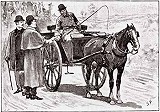“He seems a very amiable person,” said Holmes, laughing. “I am not quite so bulky, but if he had remained I might have shown him that my grip was not much more feeble than his own.” As he spoke he picked up the steel poker and, with a sudden effort, straightened it out again.
“Fancy his having the insolence to confound me with the official detective force! This incident gives zest to our investigation, however, and I only trust that our little friend will not suffer from her imprudence in allowing this brute to trace her. And now, Watson, we shall order breakfast, and afterwards I shall walk down to Doctors’ Commons, where I hope to get some data which may help us in this matter.”
It was nearly one o’clock when Sherlock Holmes returned from his excursion. He held in his hand a sheet of blue paper, scrawled over with notes and figures.
“I have seen the will of the deceased wife,” said he. “To determine its exact meaning I have been obliged to work out the present prices of the investments with which it is concerned. The total income, which at the time of the wife’s death was little short of £1100, is now, through the fall in agricultural prices, not more than £750. Each daughter can claim an income of £250, in case of marriage. It is evident, therefore, that if both girls had married, this beauty would have had a mere pittance, while even one of them would cripple him to a very serious extent. My morning’s work has not been wasted, since it has proved that he has the very strongest motives for standing in the way of anything of the sort. And now, Watson, this is too serious for dawdling, especially as the old man is aware that we are interesting ourselves in his affairs; so if you are ready, we shall call a cab and drive to Waterloo. I should be very much obliged if you would slip your revolver into your pocket. An Eley’s No. 2 is an excellent argument with gentlemen who can twist steel pokers into knots. That and a tooth-brush are, I think, all that we need.”
At Waterloo we were fortunate in catching a train for Leatherhead, where we hired a trap at the station inn and drove for four or five miles through the lovely Surrey lanes. It was a perfect day, with a bright sun and a few fleecy clouds in the heavens. The trees and wayside hedges were just throwing out their first green shoots, and the air was full of the pleasant smell of the moist earth. To me at least there was a strange contrast between the sweet promise of the spring and this sinister quest upon which we were engaged. My companion sat in the front of the trap, his arms folded, his hat pulled down over his eyes, and his chin sunk upon his breast, buried in the deepest thought. Suddenly, however, he started, tapped me on the shoulder, and pointed over the meadows.
“Look there!” said he.
A heavily timbered park stretched up in a gentle slope, thickening into a grove at the highest point. From amid the branches there jutted out the gray gables and high roof-tree of a very old mansion.
“Stoke Moran?” said he.
“Yes, sir, that be the house of Dr. Grimesby Roylott,” remarked the driver.
“There is some building going on there,” said Holmes; “that is where we are going.”
“There’s the village,” said the driver, pointing to a cluster of roofs some distance to the left; “but if you want to get to the house, you’ll find it shorter to get over this stile, and so by the foot-path over the fields. There it is, where the lady is walking.”
“And the lady, I fancy, is Miss Stoner,” observed Holmes, shading his eyes. “Yes, I think we had better do as you suggest.”

We got off, paid our fare, and the trap rattled back on its way to Leatherhead.